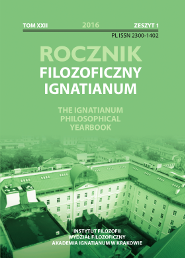Celowość w ujęciu M.A. Krąpca, S. Mazierskiego i A. Maryniarczyka
Abstrakt
Jedno ze stanowisk w ramach neotomizmu, co do interpretacji celowości (według Czesława Biedulskiego), mówi o tym, że zasada celowości ma powszechne znaczenie, dotyczy bowiem każdego bytu, który to można zdefiniować poprzez pojęcie „działania”. Tzn. każdy byt istniejący może zostać poznany jedynie poprzez jakąś formę działania (zgodnego ze swoją naturą). Byt działa, aby zachować swe istnienie, a jego dążenie do przetrwania zdaje się celem jego działania. Zatem jeśli byt działa, to działa już celowo. Filozofami, którzy uważają, że już samo działanie jest celowe, są przedstawiciele Szkoły Lubelskiej, tacy jak: M.A. Krąpiec OP, A. Maryniarczyk, S. Mazierski. Każdy z tych filozofów oparł swoje poglądy na temat celowości na rozważaniach teleologicznych Arystotelesa. Zobaczmy zatem, jak poglądy ww. uczonych na temat teleologii, opartej na liczącej sobie ponad 2000 tysiące lat filozofii Stagiryty o celowości (św. Tomasz głównie powtarzał to, co już powiedział Arystoteles), tłumaczą rzeczywistość.
Bibliografia
Arystoteles (1996), "Metafizyka" Redakcja Wydawnictw KUL.
Biedulski C (1973), "Teleologiczna interpretacja przyrody u polskich neotomistów" (21(3)), pp. 107-124.
Krąpiec MA (2008), "Problematyka celu w wyjaśnianiu filozoficznym", In Spór o cel. Problematyka celu i celowościowego wyjaśniania. , pp. 237-252. Polskie Towarzystwo Tomasza z Akwinu.
Krąpiec MA (1959), "Realizm ludzkiego poznania" Wydawnictwo Pallottinum.
Maryniarczyk A (2008), "Doskonaląca bytu funkcja dobra-celu", In Spór o cel. Problematyka celu i celowościowego wyjaśniania. , pp. 457-465. Polskie Towarzystwo Tomasza z Akwinu.
Mazierski S (1972), "Elementy kosmologii filozoficznej i przyrodniczej" Księgarnia św. Wojciecha.
Tomasz z Akwinu, św. (2003), "De bono. O dobru" Wydawnictwo KUL.
van Melsen AG (1963), "Filozofia przyrody" Instytut Wydawniczy PAX.
Ziemiański S (2008), "Teologia naturalna. Filozoficzna problematyka Boga" Wydział Filozoficzny WSF-P Ignatianum, Wydawnictwo WAM.
Rocznik przyjmuje do druku wyłącznie materiały, które nie wchodzą w żaden konflikt interesów, żaden konflikt z prawem autorskim itp. Redakcja prowadzi działania przeciw: plagiatom, ghostwriting1, guest/honorary authorship2 itp. Autor pracy zbiorowej, który jest pierwszy na liście, bierze na siebie odpowiedzialność i ma obowiązek przedstawić wkład wszystkich współautorów. Jeśli publikacja powstała dzięki dedykowanym środkom finansowym, należy ujawnić to np. w Podziękowaniu, przypisie itp. Ew. przedruki wymagają jawnego zgłoszenia i okazania odpowiedniego pozwolenia wydawniczego. Autorzy / Recenzenci nierzetelni narażają się na reakcję właściwą stosownym instytucjom.
______
1 Ma to miejsce, gdy osoba mająca istotny wkład jest pominięta na liście Autorów czy w Podziękowaniu.
2 Zachodzi, gdy na liście autorskiej pojawia się osoba mająca znikomy/żaden udział w pracy.





